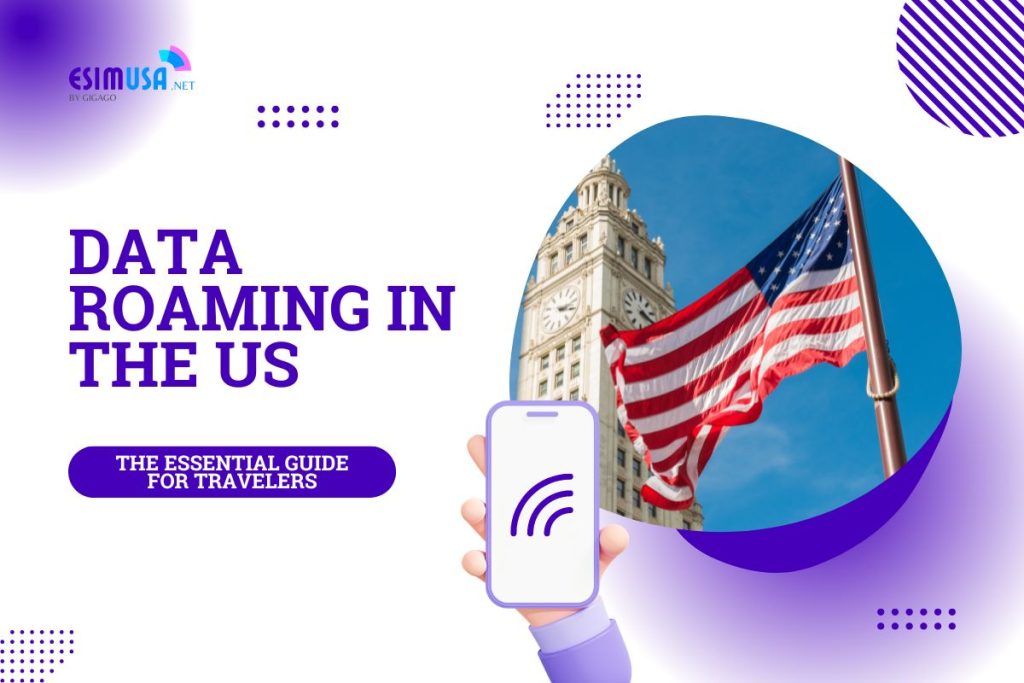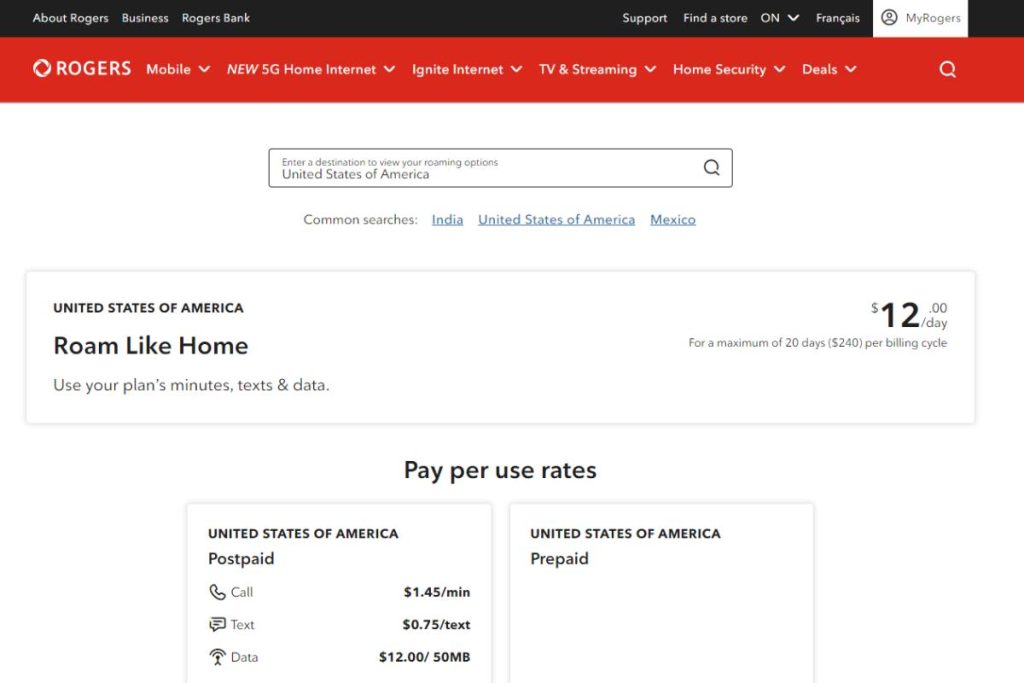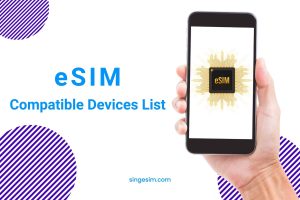Traveling to the United States can be an exciting adventure, but it’s crucial to understand the potential costs associated with data roaming, especially if you plan to use your mobile device for tasks like navigation, communication, or accessing the internet. In this comprehensive guide, we’ll explore the intricacies of data roaming in the US, roaming charges, and the best ways to avoid exorbitant fees, ensuring you stay connected without breaking the bank.

Table of Contents
I. Understand Data Roaming in the US
If you have a cellphone plan in the US, you may be familiar with roaming charges – the additional fees you incur when using your phone outside your home network coverage area. Roaming allows you to still make calls, send texts and use data when traveling, but often at a higher rate.
How roaming charges work in the US

- Cellphone networks in the US have agreements that allow customers on one carrier to use another carrier’s signal when out of range. However, the host network charges the home network extra per minute, text or megabyte of data used.
- These inter-carrier charges are then passed on to customers as roaming fees when they use their phone outside their home coverage area. Plans typically have domestic and international roaming options.
- Domestic roaming fees apply when using a US phone number outside your home region but still within the country. Rates are usually $0.25-$0.50 per minute for calls, $0.10-$0.20 per text and $5-$10 per megabyte for data.
- International roaming incurs even higher fees when traveling outside the US altogether, as foreign carriers have their own rates. Calls may cost $1-3 per minute for example.
Most major US carriers now offer plans without domestic roaming fees within the country as networks have expanded coverage nationwide. However, international roaming charges still apply for use outside the US.
II. Roaming Charges in the US
1. How to Check Roaming Charges Before Your Travel to the US

Contact your mobile provider
Before embarking on your journey to the US, it’s essential to contact your mobile provider and inquire about their roaming rates and packages. Many carriers offer specific roaming plans or add-ons that can help you manage costs while traveling.
Research applicable roaming fees
In addition to contacting your provider, you can also research their roaming fees online. Most carriers have detailed information about roaming charges on their websites, which can help you estimate the potential costs.
Call Customer Service
If you’re still unsure about the roaming charges or have specific questions, don’t hesitate to call your carrier’s customer service. They can provide you with personalized information and recommendations based on your travel plans and data usage needs.
2. Roaming Charges in the US by Canadian Mobile Operators
If you’re a Canadian traveler visiting the US, it’s essential to understand the roaming charges imposed by your mobile operator. Here’s a comparison table of the major Canadian mobile operators’ roaming charges in the US:
| Carrier | Roaming Rate Without Plan | Roaming Plan Options |
|---|---|---|
| Rogers | $12/day roaming in 185+ international destinations with Roam Like Home | $105/month for Rogers 5G Infinite Premium including Canada, US, Mexico |
| Bell | $1.99/min, $0.99/text, $6/MB | $105/month for Ultimate 150GB Canada-US plan. $13/day Roam Better add-on for US data. |
| Telus | N/A | $105/month for Unlimited 150 5G+ Can-US plan |
Rogers and Bell additionally have daily roaming rate options or add-ons that can be purchased for occasional international travel outside of Canada and the US. However, their standard pay-per-use international roaming rates without a plan would result in much higher costs.
It’s crucial to keep in mind that these charges can quickly add up, especially if you plan to use data-intensive applications or make frequent calls while in the US. To avoid bill shock, it’s recommended to explore alternative options or consider purchasing a roaming package from your carrier.
III. Best Ways to Avoid Roaming Charges in the US
1. Buy an eSIM from esimusa.net
One of the most convenient and cost-effective ways to avoid roaming charges in the US is to purchase an eSIM from esimusa.net. An eSIM (Embedded SIM) is a digital SIM card that can be activated directly on your compatible device, eliminating the need for a physical SIM card.
By purchasing an eSIM from esimusa.net, you can enjoy affordable data plans tailored specifically for travelers in the US. These plans often offer substantial savings compared to traditional roaming charges and provide you with a local US phone number for seamless communication.
Plans that may interest you
Skip the Roaming Surprise - Get Connected with esimusa.net
2. Buy a local SIM card
Another popular option to avoid roaming charges is to purchase a local SIM card upon arrival in the US. This approach can be particularly cost-effective if you plan to stay in the country for an extended period or have significant data usage requirements.
When purchasing a local SIM card, you’ll have access to various prepaid data plans offered by US mobile carriers. These plans typically provide generous data allowances at reasonable prices, allowing you to stay connected without worrying about excessive roaming fees.
Are you traveling to the US soon? Don't miss out on important communications or getting directions on the go. Click here to learn about prepaid SIM options and choose the right plan for you.
3. Enable WiFi Calling
If you prefer to keep your existing mobile plan and avoid roaming charges altogether, enabling WiFi Calling can be a viable solution. WiFi Calling allows you to make and receive calls over a WiFi connection, effectively bypassing the cellular network and eliminating roaming fees.
To take advantage of WiFi Calling, follow these steps:
- Check if your mobile device and carrier support WiFi Calling.
- Enable the WiFi Calling feature in your device’s settings.
- Connect to a reliable WiFi network whenever available during your travels in the US.
- Make and receive calls as you normally would, but the calls will be routed over the WiFi connection instead of the cellular network.
It’s important to note that WiFi Calling requires a stable and secure WiFi connection to function properly. Additionally, some carriers may have specific requirements or limitations for using this feature while roaming internationally.
IV. FAQs about Roaming in the US
What are the roaming fees like when traveling in the US with an international SIM card?
If you are traveling in the US with a SIM card from another country, you will likely incur high roaming fees for using your cellular data, making calls, or sending texts. The major US networks like AT&T and T-Mobile charge up to $10 per MB for data used while roaming internationally.
Can I use my international SIM card for free wi-fi calling and texting in the US?
While some carriers allow wi-fi calling and texting from abroad at no extra cost, the reliability varies depending on your home network and location. An alternative is to purchase an eSIM plan like those offered through esimusa.net, which will give you cellular connectivity throughout the US without roaming charges.
What is an eSIM and how can I use one while traveling in the US?
An eSIM is an embedded SIM that can be installed directly on your device without having to swap a physical SIM card. International eSIM providers like esimusa.net offer eSIM data plans that you can purchase online and activate instantly on a compatible smartphone.
Is esimusa.net a good option to avoid roaming in the US?
Yes, purchasing an eSIM plan through esimusa.net is an affordable option for international travelers to get cellular connectivity throughout the US without having to pay high roaming charges. Our plans start at around $8 for 3GB of data valid for 10 days.
V. Conclusion
Navigating the world of data roaming in the US can be a daunting task, but with the right knowledge and strategies, you can stay connected without breaking the bank. By understanding roaming charges, researching your options, and exploring alternatives like eSIMs, local SIM cards, or WiFi Calling, you can enjoy seamless connectivity during your travels while avoiding excessive fees.
Remember, proper planning and awareness of your data usage can go a long way in managing costs and ensuring a stress-free travel experience. Whether you choose to purchase an eSIM, opt for a local SIM card, or leverage WiFi Calling, the key is to find the solution that best suits your needs and budget.
Safe travels and happy roaming!












